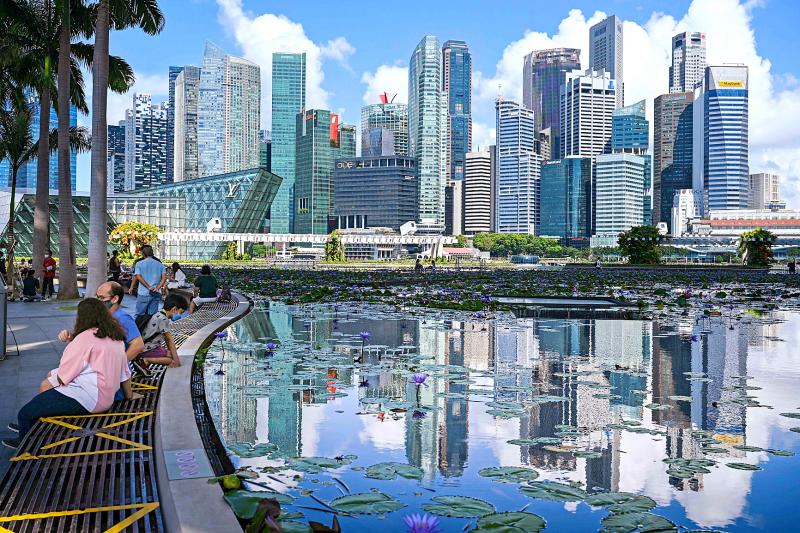Offering Sinovac Biotech COVID-19 vaccines to the public in Singapore for the first time since Friday, several private clinics reported overwhelming demand for the Chinese-made shot, despite already available rival vaccines having far higher efficacy.
Singapore has vaccinated almost half its 5.7 million population with at least one dose of the vaccines from Pfizer-BioNTech and Moderna. Both have shown efficacy rates of well over 90 percent against symptomatic disease in clinical trials, compared with Sinovac’s 51 percent.
Earlier this week, officials in Indonesia said that more than 350 medical workers have caught COVID-19, despite being vaccinated with Sinovac and dozens have been hospitalized, raising concerns about its efficacy against more infectious variants.

Photo: AFP
Evidence from other countries showed that people who had taken the Sinovac vaccine were still getting infected, Kenneth Mak (麥錫威), Singapore’s director of medical services, said on Friday.
“There is a significant risk of vaccine breakthrough,” he said, referring to the report on Indonesian healthcare workers.
A number of the people rushing for the Sinovac shot on the first day of its availability in Singapore were Chinese nationals, who felt it would make it easier to travel home without going through quarantine.
Singapore allowed the usage of the Sinovac vaccine by private healthcare institutions under a special access route, following an emergency use approval by the WHO earlier this month.
Singapore said it is awaiting critical data from Sinovac before including it in the national vaccination program.
In the meantime, authorities have selected 24 private clinics to administer its current stock of 200,000 doses. The clinics are charging S$10 to S$25 (US$7.50 to US$18.60) per dose.
“We have about 2,400 bookings, so that stretches from right now until end of July,” Louis Tan, chief executive officer at StarMed Specialist Centre, said yesterday.
He said many of those who made the Sinovac bookings tend to be in their 40s or above.
Wee Healthfirst, another approved clinic, put a notice at its entrance on Friday, saying that it had stopped reservations for the vaccine until Thursday next week, citing “overwhelming demand.”
A receptionist said about 1,000 people had registered there.
Leong Hoe Nam, an infectious diseases doctor at Rophi Clinic, also said he had been “overwhelmed” by people wanting the Sinovac shot.
Tang Guangyu, a 49-year-old engineer, was among the Chinese nationals resident in Singapore who waited for the Sinovac shot rather than take a foreign-made vaccine that he thought might not be recognized by authorities back home.
“No one wants to be quarantined for a month, I don’t have so many days of leave,” Tang told reporters as he lined up outside a clinic.

THE TRAGEDY OF PUNCH: Footage of the seven-month-old Japanese macaque has gone viral online after he was rejected by his mother and formed a bond with a soft toy A baby monkey in Japan has captured hearts around the world after videos of him being bullied by other monkeys and rejected by his mother went viral last week. Punch, a Japanese macaque, was born in July last year at Ichikawa City Zoo. He has drawn international attention after zookeepers gave him a stuffed orangutan toy after he was abandoned by his mother. Without maternal guidance to help him integrate, Punch has turned to the toy for comfort. He has been filmed multiple times being dragged and chased by older Japanese macaques inside the enclosure. Early clips showed him wandering alone with

South Korea would soon no longer be one of the few countries where Google Maps does not work properly, after its security-conscious government reversed a two-decade stance to approve the export of high-precision map data to overseas servers. The approval was made “on the condition that strict security requirements are met,” the South Korean Ministry of Land, Infrastructure and Transport said. Those conditions include blurring military and other sensitive security-related facilities, as well as restricting longitude and latitude coordinates for South Korean territory on products such as Google Maps and Google Earth, it said. The decision is expected to hurt Naver and Kakao

Australian Prime Minister Anthony Albanese yesterday said he did not take his security for granted, after he was evacuated from his residence for several hours following a bomb threat sent to a Chinese dance group. Albanese was evacuated from his Canberra residence late on Tuesday following the threat, and returned a few hours later after nothing suspicious was found. The bomb scare was among several e-mails threatening Albanese sent to a representative of Shen Yun, a classical Chinese dance troupe banned in China that is due to perform in Australia this month, a spokesperson for the group said in a statement. The e-mail

TENSIONS: The march went ahead without clashes, but arrests were still possible as police investigate suspects behind Nazi salutes, racist slurs and homophobic insults Thousands of people on Saturday marched in southeastern France under heavy security in tribute to a far-right activist whose killing, blamed on the hard left, has put the country on edge. The crowd — many wearing black and some covering their lower faces with masks — marched through the city of Lyon carrying flowers and placards bearing pictures of Quentin Deranque and the words: “justice for Quentin” and “the extreme left kills.” The 23-year-old died from head injuries following clashes between radical left and far-right supporters on the sidelines of a demonstration against a politician from the left-wing France Unbowed